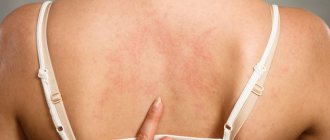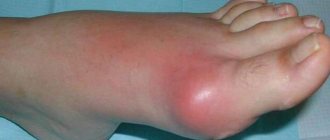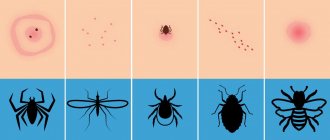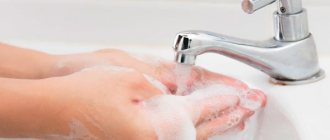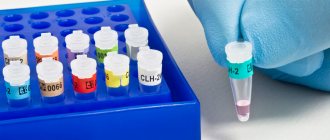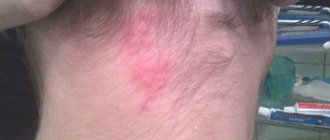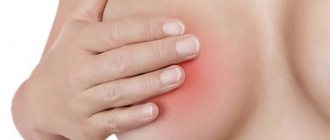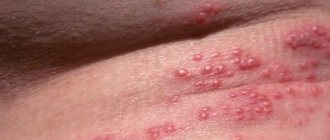Itching of the skin is a certain need to scratch the skin. The need to constantly scratch the skin can damage the top layer of the dermis. In turn, this can be complicated by pustular diseases, as a result of various bacteria entering the skin.
The cause of psychogenic itching is a mystery to doctors. Until recently, it was believed that itching occurs due to allergic reactions, dermatitis, urticaria, etc. Now they say that itching is a separate feeling, along with the sensation of cold, heat, and pressure.
The need to comb the skin arises when nerve receptors are exposed to various irritants, both internal and external. Surely, you have at least once noticed that you want to scratch your skin when you are nervous, even if your excited state is associated with pleasant events.
Unlike allergic itching, psychogenic itching does not manifest itself in any way. What should we mean by this? The skin does not change its condition: it does not peel, does not redden, and there is no rash on it. The patient has an urgent need to comb his body. Although there is no physiological need for this.
Can a rash appear due to nervousness?
Depression, nervous tension and frequent stress provoke not only headaches and a tired appearance, but also changes in the skin. Everyone is susceptible to nervous rashes: children and old people, men and women.
Allergic rash
An allergic rash or nervous allergy often worries women who do not get enough sleep, get little rest and are constantly nervous. Infants are also exposed to it due to excessive sensitivity and excessive irritability. Allergy in an adult is characterized by the appearance of skin rashes, itching, in some cases, suffocation and insomnia.
Hives
Urticaria is a predominantly allergic skin disease with characteristic rashes on the body, accompanied by unpleasant itching. It can be independent (caused by an allergen), or it can manifest itself as a consequence of other diseases.
Urticaria develops less frequently due to nervous conditions than for other reasons, but it still happens. It appears as blisters on the skin, similar to irritation from nettles, some time after suffering stress. The rash is not permanent and may either increase or decrease depending on the patient’s further behavior.
How does stress affect skin and acne?
Acne is the most common dermatological problem, the fight against which began in ancient times. Mention of acne can be found in the writings of Aristotle and Hippocrates, where they associate the appearance of rashes on the face with puberty. However, many years of dermatological research make it clear that often acne has nothing to do with age - you can wake up in the morning and find inflammation on your nose or cheeks at 13 years old or at 33 years old. The condition of the skin depends on many factors: nutrition, environment, bad habits and stress.
Acne as a consequence of stress
The relationship between acne and stress has been talked about for a long time, but research and evidence on this issue has appeared relatively recently. Nervous situations respond with many changes in the human body. One of them is the production of the hormone cortisol, which is responsible for the regulation of carbohydrate metabolism. Cortisol also has a second name - the stress hormone - from which another of its functions follows: it is produced in the adrenal glands and is designed to help the body cope with stress, but its excess negatively affects the skin and leads to acne.
Typically, the level of cortisol is associated with a person’s circadian rhythms: in the morning the amount of the hormone in the blood reaches its limit, and closer to the night, when we are about to go to bed, its level drops. Severe stressful situations lead to intense production of cortisol, and it provokes hyperplasia of the sebaceous glands. They begin to produce more sebum (sebum), which leads to clogged pores and the formation of acne. In addition, it has been proven that excess cortisol reduces the barrier functions of the skin, which means that it reacts more strongly not only to the internal causes of rashes, but also to pollution from the environment. Additionally, according to a study from Ohio University, skin regeneration is also significantly associated with cortisol levels. Scientists have concluded that an increase in the stress hormone in the blood slows down the healing of wounds and other skin lesions. Consequently, scars and post-acne marks will disappear from the skin much more slowly under increased stress.
Also, under stress, changes in intestinal flora occur, which reduces local immunity and also affects the skin. The results of such failures are an exacerbation of acne, often all over the body, and not just on the face.
Science of the Skin and Nervous System
Mental health is a very delicate matter: with constant stress or other internal discomfort, help should first be sought from specialists. The relationship between the nervous system and the skin could not go unnoticed, so recently the science known as psychodermatology has been gaining popularity.
The topics that psychodermatology studies are quite diverse and include several ways in which the skin and mind interact. Psychodermatologists work with patients whose depression may have been worsened by psoriasis or eczema, or with those whose psychological problems result in skin problems - where people deliberately harm themselves. The most difficult thing for psychodermatology is to study and understand exactly how emotional stress affects the skin. Largely thanks to research in this area, it became known how the skin responds to an excess of cortisol in the blood.
Plant-derived stress protectors
Another trend in recent years is adaptogens. These are substances of plant or animal origin that help the human body fight stress. Their positive effects were known back in Ancient China and India, but for the popularization of adaptogens in the modern world we should thank our compatriot, the famous toxicologist Nikolai Lazarev. Back in the middle of the last century, Lazarev introduced the term “adaptogens” into use, naming substances that have a positive effect on the human nervous system. In the 1960s, Lazarev’s work was continued by his students: Israel Brekhman and Igor Dardymov.
Thanks to their research, it became known that plant-based adaptogens reduce the harm caused by stress, have a positive stimulating effect on the human body, do not cause side effects and - most importantly - should not harm health.
Subsequent studies of adaptogens have shed light on the fact that they have a positive effect on the functioning of the adrenal glands and can reduce the overproduction of the stress hormone cortisol.
Of course, this does not mean that you should run to the pharmacy or the nearest Ayurveda shop for adaptogenic herbs and berries in the hope that they will get rid of acne. Before introducing adaptogens into your diet, you should consult with specialists. In addition, we must not forget about an integrated approach to solving the problem and cosmetic products aimed at combating rashes. A conscious path to restoring health is always better than spontaneous attempts at treatment.
What do experts advise?
It is obvious that in the modern world, chronic stress and poor sleep are closely related to skin condition. Stress systematically disrupts the balance of our endocrine system, leading to an increase in cortisol levels with subsequent changes in the functioning of the thyroid, gonads and other endocrine glands. This in turn can cause an increase in skin oiliness and a decrease in local immunity. That is why, against the background of prolonged negative experiences, new rashes may appear, or an already attenuated process may worsen.
The most correct thing in such a situation is to establish a full, healthy sleep, ideally, from 10 to 11 pm you should already fall asleep, since it is during this period that melatonin is actively produced - a very important hormone that protects us
Also, do not neglect the help of a psychotherapist and a dermatologist-cosmetologist - they will help you cope with this condition with the minimum possible losses.
The good news is that the negative effects of stress on your skin can be reversed. First of all, it is necessary to neutralize the manifestations of stress and learn to relax. Yoga, meditation, work with psychologists and psychotherapists, as well as neurophysiologists will help build therapy to regulate the nervous system.
In parallel with the normalization of the nervous system, acne therapy is carried out directly, depending on the severity of the disease. Nowadays, external skin care products that influence the skin microbiome and regulate sebum secretion are very relevant.
Back to list
Nervous rash in adults
The rash spreads throughout the body or in some parts of it (arms, legs, frontal part) in the form of invisible tubercles. In unstable stressful situations, papules become red or bright pink and increase in size.
Features of nervous rash in children
, small pink urticaria is most often observed . Mainly appears in skin folds and on the face. A feature of rashes in children is its rapid occurrence and equally rapid disappearance. If the child does not comb it, then when measures are taken to eliminate the disease, no marks will remain on the body.
Symptoms
Symptoms indicating the presence of a nervous allergy include the following:
- A rash appears on the body, turning into swelling;
- Itching and burning of the skin;
- Unpleasant, painful sensations when the body comes into contact with clothing;
- Heavy sweating;
- General malaise;
- Cardiopalmus;
- Trembling in the limbs;
- Dizziness;
- Nausea;
- Carrying;
- Weight loss, and in some cases rapid weight gain;
- Headache;
- Body aches;
- Fever (rare, but still observed).
Signs of the disease also include emotional disorders:
- Anxiety;
- Poor sleep;
- Decreased appetite or bouts of binge eating;
- Absent-mindedness;
- Depression or irritability;
- Antipathy to everything that happens.
In rare cases, a nervous rash can form on the lips and mucous membranes of the mouth. It can also affect the larynx and bronchi, causing Quincke's edema.
Here you will find in more detail the answer to the question about an allergic reaction and you can see a photo of Quincke's edema.
Typical localization of a nervous rash
Since the rash can appear on any part of the body, it is impossible to clearly name the places of its typical localization. But still, rashes appear more often on the face and torso, and a little less often on the arms and legs.
On the body
The appearance of a nervous rash occurs throughout the body: arms, legs, stomach, neck, butt and even on the genitals (with severe nervous shock and exhaustion of the body). In addition, the rash may disappear in one place and appear in another.
The most common manifestations of the rash occur on the abdomen, arms and legs, and between the fingers. Blisters may appear on the neck and lumbar region.
You might be interested! How do the first symptoms of scabies infection appear in children?
Photo
Looking at the photo, you can see the location and appearance of rashes on the body from the nerves, as well as the resulting swelling.
On the face
The favorite place for rashes on the face is the forehead and behind the ears. Also, frequent manifestations are seen in the cheeks and chin. The localization of the rash in these areas often occurs due to hormonal imbalance due to stress.
Photo
The photo shows how areas of the face are affected by the rash.
How is “stress” acne different from other skin problems: we’ll figure it out with an expert
This year, Internet searches on the topic “how to reduce anxiety” are breaking all records. At the same time, new terms are appearing in the beauty industry. For example, one of the latter is “maskne,” which cosmetologists use to describe rashes that appear from regularly wearing a medical mask (read about it here). But just as often, acne appears not only due to poor diet or hormonal imbalance, but also due to stress. Let's look into this topic with dermatologist and cosmetologist Anna Kalutskikh.
How stress affects the skin
Let's start with a 2022 study we found in the Journal of Clinical and Aesthetic Dermatology. According to recent data, 41% of women in France aged 25 to 40 admit to suffering from acne, with half of those surveyed believing that the breakouts are caused by stress.
Anna Kalutskikh
dermatologist, cosmetologist
— Dermatologists have been talking about the relationship between acne and stress for a long time. The stress hormone called cortisol is produced in the adrenal glands. It is responsible for the emotional background and carbohydrate metabolism in the body. However, with great stress and anxiety, the body produces an excess amount of cortisol, which can lead, first of all, to hyperplasia of the sebaceous glands. In this case, the sebaceous glands begin to produce more sebum (sebum), which, accordingly, leads to clogging of pores and the formation of inflammation.
“In addition, experts have proven that excess cortisol reduces the barrier functions of the skin,” continues the expert. “As a result, the skin can react negatively to internal processes and environmental influences: inflammation, wounds and damage heal much more slowly, sometimes practically impossible to treat at home. Also, during long-term stress, the intestinal microflora changes, immunity decreases, and this, in turn, is reflected on the face in the form of worsening acne and an increase in rashes.
Cortisol, acting on organs and tissues, is also responsible for the aging process: with its excess, the synthesis of collagen and elastin is reduced, the skin begins to lose elasticity, wrinkles and ptosis appear.
How to distinguish “stress” acne
“In order to understand that acne is caused by stress (and not, say, poor nutrition or care), you can take tests to check your hormones,” advises Anna Kalutskikh. “You should also monitor the condition of your body yourself. Typically, elevated cortisol causes more than just skin problems. Stress disrupts the balance of the entire body: immunity decreases, headaches may bother you, you may feel constant anxiety, etc. It is especially worth considering if inflammation and acne appeared some time after unpleasant events, but you did not change your skincare and decorative cosmetics, led a healthy lifestyle, and ate right.
In some cases, inflammation caused by stress, unlike other types of rashes, appears on the oiliest areas of the face - the T-zone. Often, along with inflammation, there may be enlarged pores, blackheads, uneven or grainy skin tone, redness and itching.
Another characteristic sign of skin problems due to cortisol is that acne goes away, but then appears again in the same place.
What to do
“First of all, it is necessary to reduce anxiety, and to do this, adjust your sleep schedule: go to bed before 23:00, since it is at this time that melatonin is produced, which is responsible for the normal functioning of circadian rhythms,” says the cosmetologist. — It’s equally important to improve your diet and try not to worry. It is best, of course, to turn to good specialists. A neurologist, for example, will help develop therapy to regulate the nervous system and reduce tension.
As for care, it is important to choose the right products. Pay attention to toners with salicylic acid. And if acne does not go away for a long time, be sure to make an appointment with a dermatologist. After collecting anamnesis, he will prescribe treatment depending on the severity of the disease. These can be salon treatments and home care.
Diagnosis of nervous rash
It is not easy to identify allergies due to nerves. The fact is that the main clinical manifestations occur against the background of severe stress or nervous shock, and by the time you visit the doctor, the symptoms have already subsided.
If an allergy is suspected, the doctor prescribes skin allergy tests and a clinical test to determine the level of immunoglobulin E. The doctor also assesses the patient’s neuropsychic status and, if necessary, prescribes a consultation with a psychotherapist.
You can learn about other types of rashes and see photos with explanations of the rash on a child’s body here.
Other causes of acne
The appearance of acne due to stress is not uncommon, but there are other causes of acne 29, 50:
- unbalanced diet;
- incorrectly selected cosmetic care;
- failure to comply with personal hygiene rules;
- diseases of internal organs;
- hormonal disorders;
- long-term use of certain drugs, for example, glucocorticosteroids;
- mechanical influence (pressure, rubbing).
By eliminating stressful situations from your life, you can reduce the severity of acne, but you will not be able to get rid of the disease completely.
Treatment of nervous rashes
Treatment of a nervous rash involves the use of complex methods until the nervous system and skin are completely restored:
- Elimination of nerve irritants that provoke the disease;
- Psychotherapy;
- Drug treatment of disorders (insomnia, depression, irritability and others);
- Outdoor recreation, daily walks in the fresh air, watching positive films and reading books, good sleep;
- A diet based on “joy” foods (chocolate, coffee, nuts, sea fish - in moderation);
- Do not use washcloths when bathing, so as not to further irritate the inflamed areas of the body;
- Instead of shower gels and other chemical detergents, use baby soap;
- Take baths with chamomile or baking soda to relieve itching. Sea salt also helps if there are no wounds on the skin;
- The water during bathing should not be too hot or cold. The optimal option is 40 degrees;
- If the rash is severe, wear non-tight clothing made from natural, lightweight materials;
- Acupuncture;
- Acupressure body massage that soothes and relaxes;
- In difficult cases, it is possible to take antidepressants under the supervision of a psychotherapist.
In advanced forms of the disease, hospitalization for up to 2 weeks for complete recovery or rest in a medical sanatorium is possible. By ignoring the presence of nervous diseases and not taking any treatment measures, a person provokes the development of psychoneurosis.
Predisposing factors
Skin diseases provoked by emotional disturbances are in most cases recorded in young children and hysterical women, and pregnant women.
In most cases, pathologies are temporary . However, medicine knows cases of the chronic course of such pathologies associated with unfavorable working conditions and individual characteristics of the human nervous system.
Among the most common reasons leading to the appearance of spots are:
- mental and emotional overload;
- depression;
- irritability or aggression;
- chronic lack of sleep;
- fears;
- disturbances in the cardiovascular, endocrine or digestive systems;
- decreased immunity;
- hormonal imbalances;
- general intoxication.
Prevention
Preventive measures to avoid attacks of the disease should be carried out daily. These are simple procedures and rules. They do not burden your normal lifestyle.
Prevention measures:
- Avoid stressful situations.
- Complete nutrition. The diet should contain a sufficient amount of vitamins and minerals; the internal balance of a person’s condition depends on this. Fasting is prohibited. It provokes nervous stress and exhaustion of the body.
- Maintain drinking regime. Water speeds up metabolic processes and saturates the body with oxygen.
- Drink various soothing infusions of mint, lemon balm and chamomile. Milk with honey at night improves the quality of sleep.
- Sports and fitness activities. With the help of yoga, you can calm down and find emotional balance, and relax a little.
- Taking additional complexes of vitamins and microelements to improve immunity and resistance to stress.
- Be able to distract yourself from business and switch to relaxation. Having a hobby is the best option.
- Think positively even in difficult situations. There is always a way out. In a calm state, a person is able to cope with many things.
- Use breathing exercises. With the help of this procedure it is very easy to calm down and activate brain activity, concentrate and make the right decision.
- Experimenting, changing something and trying new things always improves your mood and gives you a surge of energy.
- If self-control gets out of control and no calming technique is suitable, then it is better to seek help from a psychologist. He will listen, determine the complexity of the moral state and prescribe therapy to improve and strengthen well-being.
It is important to use various therapies and procedures for relaxation. This will help take your mind off problems and improve the functions of the nervous system. Any failures and violations must be stopped at the early stages with the help of specialists and independent exercises. A healthy nervous system means a beautiful appearance and good health.
